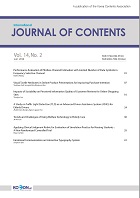- Log In/Sign Up
- P-ISSN1738-6764
- E-ISSN2093-7504
- KCI
 ISSN : 1738-6764
ISSN : 1738-6764
Exploring the Usage of the DEMATEL Method to Analyze the Causal Relations Between the Factors Facilitating Organizational Learning and Knowledge Creation in the Ministry of Education
Abstract
Knowledge creation and management are regarded as critical success factors for an organization's survival in the knowledge era. As a process of knowledge acquisition and sharing, organizational learning mechanisms (OLMs) guide the learning function of organizations represented by its different learning activities. We examined a variety of learning processes that constitute OLMs. In this study, we aimed to capture the process and framework of OLMs and knowledge sharing and acquisition. Factors facilitating OLMs were investigated at three levels: individual, group, and organizational. The concept of an OLM has received some attention in the field of organizational learning, however, the relationship among the factors generating OLMs has not been empirically tested. As part of the ongoing discussion, we attempted a systemic approach for OLMs. OLMs can be represented by factors that are inherent to the organization’s system; therefore, prior to empirically testing the OLM generating factor(s), evaluation of its organizational integration is required to determine effective treatment of each factor. Thus, we developed a framework to manage knowledge and proposed a method to numerically evaluate factors influencing the OLMs. Specifically, composite importance (CI) of the Decision-Making Trial and Evaluation Laboratory (DEMATEL) method was applied to explore the interaction effect of these factors based on systemic approach. The augmented matrix thus generated is expected to serve as a stochastic matrix of an absorbing Markov chain.
- keywords
- Organizational Learning Mechanism, Learning Organization, DEMATEL, Knowledge Creation
- Downloaded
- Viewed
- 0KCI Citations
- 0WOS Citations

